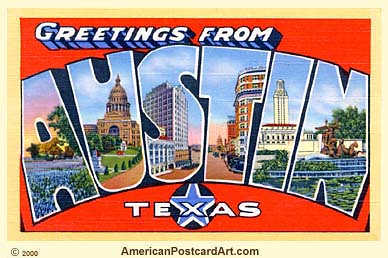This broken American family
Grandma relieved me at noon, and I headed home to shower, shave and catch a nap. We have family all over central Oklahoma, but Grandma and I are working a two-person rotation. I came back just before 6, and she headed home for the night around 7:30. I'm going back to Denton in the morning, and Mom and Dad are driving up from Houston tomorrow to pick up my shifts. I've been feeling guilty about not doing this for my grandparents every time Grandpa's been in the hospital, and I regret that I live far enough from them that I have to put my life on hold just to help out. But I'm also angry. I can't believe that I have cousins, aunts and uncles, on both my mother and father's side of the family, all living within an hour of this hospital. Only my aunt, my Mom's sister, has stopped by for a visit. Once, on her way home from work.
I'm angry because my thoroughly modern, nuclear family has splintered into its molecular components, and we no longer have a functioning support network with the capacity to care for each other without significantly overburdening immediate family. My mother and her sisters and brother each take care of their parents in their own respective ways, but the presence required at times such as this is a sacrifice borne unequally between them. I don't blame this disparity on any sibling in particular, because the fact of the matter is that some of our lives are more malleable than others. Dad is retired, and Mom is just that rare person who puts everything aside at any moment to take care of her family. I've been lucky enough to create a freelance lifestyle that affords me the means and latitude to put everything aside for a couple of days to come up here. Others can't, and it's not their fault. This is a cultural problem, a social illness. This family structure is unsustainable. The intergenerational disconnect that transforms elderly care into a burden is an indication of a profoundly diseased society. This social order is untenable. Congress is debating Social Security reform, focusing on ways that individuals can gain greater control over personal accounts, as if financial concerns alone define the concept of security. I promise you, Melvin could have all the money in the world right now, and he'd trade it for the company of family. We need a collective reconsideration of what we mean when we speak of wealth and poverty.
I'm angry because my thoroughly modern, nuclear family has splintered into its molecular components, and we no longer have a functioning support network with the capacity to care for each other without significantly overburdening immediate family. My mother and her sisters and brother each take care of their parents in their own respective ways, but the presence required at times such as this is a sacrifice borne unequally between them. I don't blame this disparity on any sibling in particular, because the fact of the matter is that some of our lives are more malleable than others. Dad is retired, and Mom is just that rare person who puts everything aside at any moment to take care of her family. I've been lucky enough to create a freelance lifestyle that affords me the means and latitude to put everything aside for a couple of days to come up here. Others can't, and it's not their fault. This is a cultural problem, a social illness. This family structure is unsustainable. The intergenerational disconnect that transforms elderly care into a burden is an indication of a profoundly diseased society. This social order is untenable. Congress is debating Social Security reform, focusing on ways that individuals can gain greater control over personal accounts, as if financial concerns alone define the concept of security. I promise you, Melvin could have all the money in the world right now, and he'd trade it for the company of family. We need a collective reconsideration of what we mean when we speak of wealth and poverty.


0 Comments:
Post a Comment
<< Home